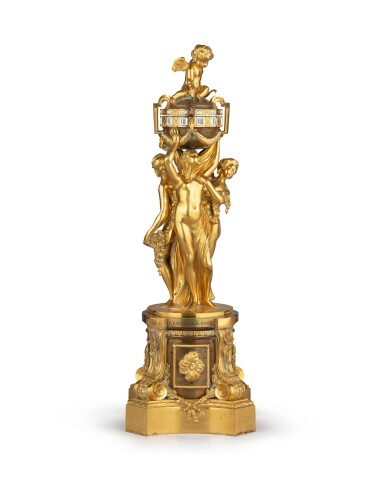De Lisbonne à Paris : Deux intérieurs parisiens
De Lisbonne à Paris : Deux intérieurs parisiens

Un intérieur parisien à Lisbonne
A Louis XVI gilt-bronze and patinated bronze cercles tournants mantel clock by Lepaute, the case by Francois Vion | Pendule en bronze doré et bronze patiné à cercles tournants d'époque Louis XVI, le mouvement par Lepaute, la caisse par François Vion
Lot Closed
November 18, 02:48 PM GMT
Estimate
24,000 - 34,000 EUR
Lot Details
Description
A Louis XVI gilt-bronze and patinated bronze cercles tournants mantel clock by Lepaute, the case by Francois Vion
circa 1770
modelled with The Three Graces supporting a globe mounted with the hour and minute rings each with enamel cartouche numerals, surmounted by Cupid seated and indicating the time with an arrow, the movement contained within the plinth base with scroll corners, signed LEPAUTE A PARIS and VION to base
Height 20 in
__________________________________________________________________________
Un intérieur parisien à Lisbonne
Pendule en bronze doré et bronze patiné à cercles tournants d'époque Louis XVI, le mouvement par Lepaute, la caisse par François Vion
vers 1770
modelé avec Les Trois Grâces supportant un globe monté avec les anneaux des heures et des minutes chacun avec des chiffres cartouche en émail, surmonté de Cupidon assis et indiquant l'heure avec une flèche, le mouvement contenu dans la base du socle à coins à volutes, signé "Lepaute a Paris" sur le cadran , et "Vion" à la base
Haut. 51 cm
Collection of Princess Paley;
Collection Rene Fribourg, New York;
Sotheby's London, The Rene Fribourg Collection, 28th June, 1963, vol. III, part I. lot 176;
When acquired and thence by descent.
This clock is result of the successful partnership of two outstanding Parisian workshops, the clockmakers Lepaute, horlogers du roi, and Francois Vion, one of the leading bronzier of his time. Its design was described in the 18th century as 'Le temps qui passe entre l'amour et les Grâces', believed to have been created by Vion. and is reproduced in a coeval album of designs now conserved in the Bibliothèque Doucet, Paris (VI E 15, Rés.fol.20/1; illustrated in Ottomeyer, Vergoldete Bronzen, 1986, vol. I, p.179, ill.3.7.4)
An identical clock at the was purchased by General Moreau; subsequently acquired by the garde-meuble following its arrived at Fontainebleau, it was recorded in the appartements of Général Moreau in 1804 (J.-P. Samoyault, Le Mobilier du Général Moreau, Paris, 1992, p.42, fig.33).
Other clocks of this model are conserved in the
- Metropolitan Museum of Art, New York (accession nr 41.41);
- Musée du Louvre, Paris (OA 5433)
- Château de Fontainebleau (Inv.F918 C)
- Huntington Gallery, San Marino (ill. in R. Wark, French Decorative Art in the Huntington Collection, 1979, p.70, fig.91).
- Royal Ontario Museum, Toronto (ill. in 'French Clocks in North American Collections', Exhibition Catalogue, 1982-83, pp. 80-81)
Another example, from the Duques de Cadaval collection, was sold Christie's London, 14 March 1996, lot 148 (£41,800) and one other, which belonged to Hyppolite-Michel Gigault de Crisenoy in the early 19th century was sold with Christies New York, Magnificent French Furniture, 2nd November 2000, lot 2 ($98,000).
